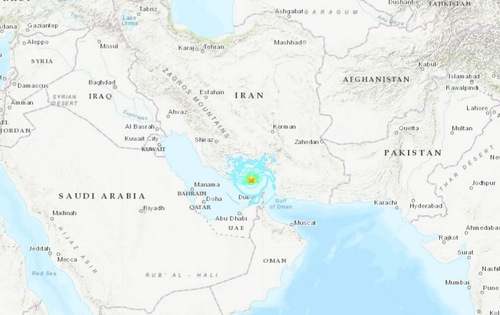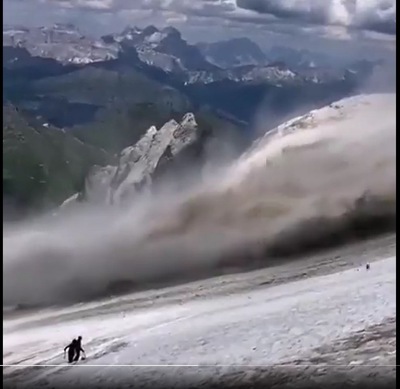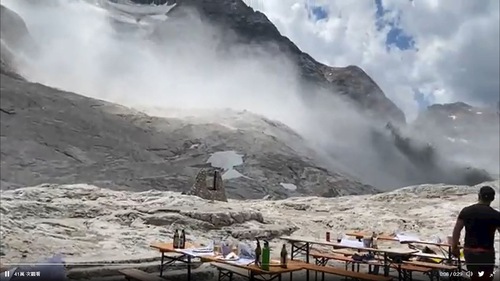(Minghui.org) A series of strong earthquakes occurred in southern Iran on July 2, 2022 (Saturday). The second earthquake reached a magnitude of 6.0, killing at least five people.
The largest glacier in the Italian Alps collapsed on July 3 and triggered an avalanche, killing at least seven people and injuring eight. Thirteen mountain climbers were still missing two days after the incident.
A high temperature of more than 35°C has been recorded in central Tokyo, Japan for nine consecutive days by July 3, the longest high temperature record since observations began in 1875. Seventeen people died of suspected heat stroke.
Five Dead, 49 Injured in Series of Strong Earthquakes in Southern Iran
A series of powerful earthquakes struck southern Iran on Saturday, July 2, 2022, killing at least five people, injuring 49 and damaging dozens of buildings, the Central News Agency reported.
 According to the US Geological Survey, a magnitude 6.0 earthquake occurred west of Abbas, the port city and provincial capital of Hormozgan Province, Iran on July 2, 2022. (USGS webpage usgs.gov)
According to the US Geological Survey, a magnitude 6.0 earthquake occurred west of Abbas, the port city and provincial capital of Hormozgan Province, Iran on July 2, 2022. (USGS webpage usgs.gov)
The United States Geological Survey (USGS) stated that there were two earthquakes with a magnitude of 6.0 that day, hitting the west of Bandar Abbas, the capital of Iran's Hormozgan Province and a port city of more than half a million people. The focal depth was 10 kilometers.
Hormozgan Governor Mehdi Dousti said that five people were killed in the quake and most of the damage to buildings occurred in Sayeh Khosh, a village near the epicentre.
Television news footage showed homes in the village of Sayeh Khosh being razed to the ground, rubble covering roads and power outages in the village. It is reported that there are about 300 people living in the village. Abbas has a population of more than 500,000.
Glacier Collapse in Italian Mountains Kills Seven, Injures Eight

 The collapse of the largest glacier in the Italian Alps triggered an avalanche on July 3, 2022.
The collapse of the largest glacier in the Italian Alps triggered an avalanche on July 3, 2022.
The largest glacier in the Italian Alps collapsed on July 3, triggering an avalanche, killing at least seven people and injuring eight others.
Agence France-Presse reported that the glacier collapse occurred on the Marmolada mountain, the highest peak in the Italian Dolomites. Authorities said it was unclear how many climbers were hit when the glacier fell.
The day before the disaster, the peak of the glacier recorded a record high temperature of 10°C.
“An avalanche of snow, ice, and rock hit an access path at a time when there were several roped parties, some of whom were swept away,” an emergency services spokeswoman Michela Canova told AFP. She said six people had been confirmed dead and eight were injured. One more was confirmed dead since her interview. “The total number of climbers involved is not yet known,” she added.
The Alpine rescue team said that a huge ice block collapsed near Punta Rocca in the Marmolada mountains at the time of the incident. Hikers and climbers usually reach the summit from here.
It was reported that 13 climbers were still missing two days after the incident.
Although it is only early summer, the heat wave is already rolling in most of Italy. The Po River, which accounts for about one-third of the country’s agricultural output, is suffering from the worst drought in 70 years.
Tokyo’s Nine Day Heatwave Sets New Record Since 1875
The Central News Agency reported that a high temperature of 35.3°C was measured in central Tokyo, Japan on July 3. Scorching heat of more than 35°C occurred for nine consecutive days, setting the longest record since observations began in 1875.
In Japan, the temperature above 30°C is called “true summer day,” and the temperature above 35°C is called “scorching summer day.”
The temperature in many places in western and eastern Japan exceeded 40°C, and the temperature in Kiryu City, Gunma Prefecture reached 40.4°C on July 1, setting a record for the highest temperature this year. In the center of Tokyo, 37°C was observed that day.
June 25, 2022 marked the earliest record of “scorching summer day” in observation history in central Tokyo and the scorching summer days lasted until July 3, for a total of nine consecutive days. This broke the eight-day record set from July 31, 2015 to August 7, 2015.
According to preliminary official statistics, in Tokyo, a total of 1,517 people were sent to hospitals for suspected heat stroke, and 17 of them died from it by July 2, hitting a new high in June in ten years. Officials called on the public to take measures to prevent heat stroke.
All content published on this website is copyrighted by Minghui.org. Minghui will produce compilations of its online content regularly and on special occasions.
Category: Media Reports









